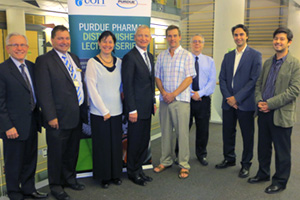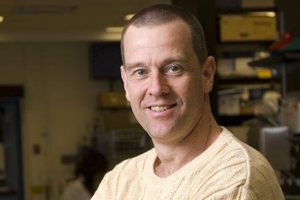2013 Purdue Pharma Distinguished Lecture at UOIT
University of Toronto researcher advocates new model for drug development
October 7, 2013

University of Ontario Institute of Technology (UOIT) students and Oshawa residents had a recent chance to hear about some new ideas that clash with long-held assumptions in health-care circles - provocative notions that may help lead to cures for diseases that plague our world.
“The world’s drug discovery ecosystem is simply not working – we need to change the playing field as soon as we can to combat rising health-care costs,” said the University of Toronto’s Dr. Aled Edwards. “Too many scientists and too many companies are competing to develop the same new medicines. Even after years of careful testing, more than 90 per cent of all new medicines fail to be effective. As Canadian society ages and health-care costs rise, when the billions of dollars we invest developing new drugs so frequently ends without success, the long-term price we could pay as an aging society is staggering.”
Dr. Edwards was welcomed to UOIT on September 24 as the featured speaker for the sixth-annual Purdue Pharma Distinguished Lecture. Dr. Edwards’ presentation Open Access Drug Discovery outlined his position that industry and academia need to adopt new approaches to explore the many unknowns of human biology and to manage the unpredictable and expensive process of drug discovery. His solution? Drug development with no patents – where researchers actually share their discoveries, with no strings attached.
- Download Dr. Edwards’ lecture which explains his patent-free drug proposal
- Download audio transcript of Dr. Edwards' lecture
In a system where almost all new drugs fail to make it to commercialization, Dr. Edwards says it is in the best interests of researchers and industry to reveal their research discoveries – successes and failures – to each other. One company working on Drug A may find their drug doesn’t work on a given disease – but another company might then try to work with Drug A and discover it’s a good match for an entirely different disease.
“The current system is not producing enough new medicines to sustain the pharmaceutical sector, nor the cures for society’s most impactful diseases, such as mental illness and dementia,” says Dr. Edwards. “The associated costs of treating these diseases will grow, and eventually cripple our economy.”
Dr. Edwards is a Professor in the Faculty of Medicine at the University of Toronto. In addition to being the Director and CEO of the Structural Genomics Consortium, he is also a Visiting Professor of Chemical Biology at the University of Oxford in the United Kingdom.
“UOIT was delighted to have Dr. Edwards visit us to share his challenging ideas with our academic community, our graduate students and our undergraduate students,” said Dr. Douglas Holdway, Dean, UOIT Faculty of Science. “There was much interest in learning about Dr. Edwards’ vision for how all medicines may be discovered in the future. We owe a great deal of gratitude to Purdue Pharma for its unwavering support of this lecture series which made this event possible.”
“Throughout the years, this lecture series has provided a great opportunity to learn about the remarkable work of world-class researchers,” said Randy Steffan, Vice-President, Corporate Affairs, Purdue Pharma. “Purdue Pharma is proud to continue its association with this important annual event and its support of UOIT’s Faculty of Science.”
Based in Pickering, Ontario, Purdue Pharma is a leading pharmaceutical company that generously funds the Purdue Pharma Distinguished Lecture series (established in 2008). This public lecture connects UOIT students with leading scientists and encourages them to explore career opportunities and research options within the health science industry and beyond. Purdue Pharma also supports an annual bursary which supports a UOIT student in the Pharmaceutical Chemistry program.



